Songs of Enchantment Read online
Page 2
Mum said:
‘You spend all your time talking about this university for beggars, but what about us, eh? Are we not beggars? Don’t you hear how cracked my voice is? From morning till night I walked this ungodly city, hawking my provisions, crying out, while you slept like a goat for seven days.’
Leaping to his feet, dad vented his full fury at mum. Blindly, he hurled his boots at the cupboard. The cupboard door flew open, revealing the pots empty of food. Cockroaches were sent scampering everywhere. Stamping his feet, lashing the air with his big fists, he went quite berserk with shouting. He said mum was entirely devoid of vision and spent all her energy counting her wretched profits, while he tried to improve the condition of the people.
‘Improve our condition first,’ mum replied.
Dad was momentarily stunned at the boldness of mum’s interruption. She continued.
‘Where will you get the money to build a school for mosquitoes, talk less of beggars, eh? Will you steal, eh? Do you think money falls out of dreams, eh?’
Dad stopped in the beginnings of an antagonistic gesture.
‘But what about all the money I won?’ he asked, staring at us in utter disbelief, his bewilderment tinged with rage.
We were silent. We had completely forgotten the huge amount of money due to dad for winning the battle with the warrior from the Land of Fighting Ghosts. Worried about his injuries, awestruck by his fabulous sleep, and distracted by his recuperation we had not remembered that Sami, the betting shop man, owed us what amounted to a sizeable fortune.
‘WHAT ABOUT MY MONEY?’ dad cried again.
‘We forgot,’ I said.
Mum shot me a furious glance. Dad sat on his chair and kept staring at us alternately, as if we had committed acts of unbelievable criminality.
‘Do you mean to tell me,’ he said, pressing such menace into every word, ‘that you people haven’t YET collected my money, eh?’
We dug deeper into our silence. Mum started to fidget. Then dad, jumping up, sending the three-legged chair flying from underneath him, truly unleashed his mistral rage.
‘You are not on my side,’ he bellowed at mum. ‘You are clearly my enemy! You want me to fail! You want me to be destroyed by the world! You go around in dirty clothes, and ugly shoes, and a disgusting wig of a he-goat, when I have hundreds of pounds sitting just across the street! You starve me, you starve my son, you obviously feed yourself in secret, and meanwhile you don’t even bother to secure my investments! I carry loads that would break the neck of Hercules. I fight with giants and monsters and thugs. Yes, I fight and get beaten and manage to win – and I win only because of you two – and yet, through all this agony, you don’t even bother to look after the fruits of my victory?’
Dad paused. Then he drew a deep breath and, thrusting his raw face at mum, he shouted:
‘GET OUT OF MY HOUSE, YOU USELESS WOMAN WITH YOUR STUPID WIG! GET OUT! Go and sell your stupid provisions from morning till night! YOU ENJOY SUFFERING – YOU ENJOY POVERTY! Fine! GO and enjoy your poverty somewhere else and DON’T COME BACK! I will not kill myself for an UNGRATEFUL WIFE!’
Mum bore his tirade in a dangerous and stiff-necked silence. When dad had exhausted himself, mum stood up. With the movements of one who was enacting a decision she had reached long ago, she began to bundle her possessions. She gathered her faded wrappers, her moth-eaten wig, her undergarments, her old blouses, her slippers, her cheap jewelry, her tin-can of money, and dumped them all into an ancient box. Having almost reached the end of her forbearance, she took dad’s words extremely seriously.
‘Where are you going?’ I asked.
She screamed at me, deafening me with the full volume of her life-long frustration. Dad stamped on the ground with his boots, downed a shot of ogogoro, and stormed out of the room. I followed him, but I kept a careful distance between us. The demon-girl was growing in him, becoming more luminous and ecstatic.
4
A BIZARRE COURTSHIP
OUTSIDE, GREEN MOTHS were thickening in the air. No one seemed to notice. Dad was striding furiously to Sami’s betting shop when he saw Helen. Her beauty was more hypnotic than ever. Her blind eye was darker, her good one more jewelled, and she was sitting on the bonnet of the burnt political vehicle, surrounded by the moths.
As if magnetised by the force of her astonishing serenity, dad changed direction and ran over to her. He was about to speak when she turned her strange eyes to him and said:
‘It’s time for us to go.’
‘Why?’ dad asked.
‘When the time is right we will be back,’ she replied, turning away from him.
Dad pleaded with her to stay. The more he pleaded, the less interested she seemed. After a while she jumped down from the bonnet. The other beggars appeared mysteriously with rotting corn-cobs and mouldy bread in their hands. They gathered round Helen, awaiting her command. The moths had concentrated about them as if their poverty and their wretchedness were a unique kind of light. Without uttering another word Helen led the beggars up the road. The moths went with them, their clattering wings sounded oddly metallic.
Dad stood still for a long moment, watching the beggars leave. His face was disconsolate and it seemed his dreams were deserting him. The beggars had gone a short distance when dad broke the trance of his abandonment and ran after them. The street watched us. The moths clicked in our faces. Thickly gathered around the beggars, they seemed a kind of shield. Was I the only one who saw the moths? Dad didn’t seem to, for he had launched into an impassioned plea directed at the beggar girl. Staring deep into her gem-like eye, he begged her to give him one last chance to fulfil his promise. He blamed his neglect on his recuperation, on me and mum; and swore that he was going to build a school for them as soon as he had collected his money from the betting shop man.
‘I will prove it to you,’ he kept saying.
But the beggar girl, deaf to his entreaties, carried on walking. Glowing in a new delirium, dad began to praise her beauty and her elegance, her face of a yellow moon, her limbs of a blue gazelle, her eyes of a sad and sacred antelope. He completely amazed me with his declaration of fearless love. In a burning voice, robust and insane, he said:
‘I dream of you every day, my princess from a strange kingdom. Everyone else sees you as a beggar, but I know you belong to a golden throne. You are so beautiful that even these butterflies . . .’
‘Moths,’ I corrected.
Dad glared at me, tapped me on the head, and proceeded with his bizarre, passionate courtship.
‘. . . that even these butterflies cling to you as if you are honey. You have the head of a spaceship, your eyes are like those of the wonderful maidens of Atlantis, you belong to the angelic kingdoms beneath the sea. You are a moon-woman come to brighten the earth. Your skin looks like flowers from another planet. You are the mistress of beauty, princess of grace, Queen of the road. Let the flowers of the earth see you and weep . . .’
Dad went on and on, pouring out a stream of contradictory praises. The beggars ate their mould-encrusted bread and laughed at dad’s ridiculous words. Helen remained indifferent. Unable to bear her indifference, his face twitching under the assault of the moths, dad finally blocked her path, just before we got to Madame Koto’s barfront. He astounded me by saying:
‘I want you to be my second wife. Stay and marry me. I will take care of your people.’
The beggar girl went on as if she hadn’t heard anything. Then dad – his spirit swirling in the new yellow delirium – boldly declared his intention to honour his promises. He said Helen should come with him to Sami’s betting shop, and if all he was saying wasn’t true, if he didn’t have the money to build them a school, to feed and cater for them, then she was free to go. He made a solemn oath, loudly and with dramatic gestures.
For the first time Helen acknowledged his persistence. She stopped. Dad’s face broke into a triumphant smile. Turning to the rest of the beggars, he told them to wait for him. Then he seized Helen’s h
and and set off with her towards Sami’s shop. Pestered by the moths, he strode defiantly through the rumour-making stares of the street.
Just as we were going past our house, mum emerged with her tattered wig on and her ancient box under her arm. Dad didn’t notice her. She looked so unlike herself, so wretched and haggard, as if she were a tramp, or as if she were fleeing the compound in shame, that even I nearly didn’t recognise her. She followed us a short way and then, loud enough for the whole street to hear, she shouted:
‘So you want me to go, eh? So you are throwing me out because of that stinking beggar girl with a goat’s eye, eh?’
Dad looked back, saw her through the eyes of the demon sitting comfortably inside him, made a dismissive irritated movement of his hand, and carried on, dragging the unwilling but mesmerised beggar girl with him. The demon that had entered my father had moved in for good. The occupation was complete. I could see his spirit whirling with grand dreams of love. For, as he went, oblivious to the terrible changes he was bringing into our lives, I realised how much dad was brimming over with love, possessed by its secret madness, bursting with love for everything, a wild unholy indiscriminate love, a love so powerful that it made him feel like a god, so vast that he didn’t know how to contain it or express it. The love in him had become a double demon and it propelled him towards chaos.
Mum began weeping bitterly, cursing all the years of her privation and suffering, cursing the day she set eyes on dad in the village, during the most beautiful years of her life, swearing at dad for having drained the life out of her in so profitless a marriage. And between them both I didn’t know who to choose. Mum went off, wailing, in the direction of Madame Koto’s fabulous bar. Dad marched on to Sami’s place, unmindful of the destruction he was sowing behind him. I started after mum, but she screamed at me, as if she perceived that I was in alliance with dad. And it may have been because of the moths (which I alone saw as moths), because of Helen and her tattered yellow dress, her emerald eye, or because of dad’s polished boots and his bristling demonic love, or because I didn’t really believe mum would disappear from our lives, that I chose to go after dad – for with his mad passion lay the greater magnetic adventure, the curiosity and the rage.
And so, watching mum grow smaller in the distance, a slouching figure, wailing and rending her wig, I reluctantly stuck with dad’s story, and suffered the choice I made for many nights to come.
5
THE DEMON’S GIFT
WHEN WE GOT to Sami’s betting shop we were alarmed to find that his signboard was no longer posted outside. The main door was padlocked and two planks had been nailed across it. Dad knocked and got no answers. The beggar girl watched from a short distance away, the moths swirling round her head in perpetual motion. Dad banged on the door. Then he kicked it and ran against it with his shoulder. The wood splintered. He raised such a racket with his banging and shouting that the compound people came rushing out with sticks and machetes, fearing that they were being robbed, or that the political thugs had returned to wreak greater oppression on their lives. When dad saw them he asked in an angry voice where Sami had gone.
‘He has left, packed away,’ one of the neighbours said.
‘Packed away? To where?’
‘Black Tyger, why are you asking us? He’s gone, that’s all we know.’
‘Gone? Gone? What about my money?’
‘Do I owe you money? Why are you asking me about your money, eh?’
‘My fight money, my money, where’s my money?’ dad kept screaming, kicking the door, ripping off the planks, lashing out, foaming at the lips, his rage conquering him.
Such energy and fury swirled round him that he staggered, quivering, under the blind intensity of the demon’s gift.
‘You are all hiding him! This is a plot! You are all trying to keep the money I nearly died winning,’ he yelled, rushing at the compound people.
The men fell on him and hammered him with their clubs and sticks. I screamed. Dad threw punches in every direction, flooring two of the men. The women, howling, pounced on him with brooms and firewood. The other men went to get reinforcements. Soon the landlord came rushing out, clad only in his wrapper, holding a cocked dane gun in his hands, demanding to know the cause of the commotion. But the reinforcements jumped on dad. There was much hollering. A crowd gathered. Dad disappeared under the tumble of bodies. The men hit out indiscriminately, lashing their own. Children cried around their mothers. A little girl was accidentally clubbed on the head by an over-enthusiastic neighbour. The girl’s mother clubbed the neighbour back, and the fight widened.
From beneath the crush of bodies I heard a mighty cry, and when the cry reached its frightening pitch the wind cracked a tree branch near us. Helen started to retreat. The crowd swelled, and somehow became included in the scuffle. The rest of the beggars arrived. Seeing that dad was being beaten, they fell in and clawed away at every moving body. They kicked and bit and punched whatever was in their way, till the mountainous tumble became a frenzied hybridous animal of many limbs tortured by its own insanity. The moths flew everywhere, circling the fighting men. And then suddenly dad emerged, his head crowned with mutinous lights, his suit in complete tatters. The beggars were sprawled around him like gigantic insects in mid-transformation. The women groaned about their broken limbs and the men about their battered heads. The landlord stood in the midst of all this, his wrapper torn from round his waist. He was completely naked. His eyes surveyed the chaotic events with controlled disdain. His dane gun was pointed at the writhing centre of bodies. One of the beggars saw his imperious and terrifying stance, and released a strange cry. The landlord, without changing his expression, trained his gun on the beggar; dad jumped in front of him; a child began yelling; and when the moths rushed upwards, surrounding the landlord, when the landlord directed the muzzle of the gun at dad’s chest, the lights changed, everyone screamed, the air darkened, a sulphurous tiger of light leapt out into the new darkness, transfiguring the beggars, and a dreadful noise exploded in our ears. Everyone dived for cover and when the noise cleared there was a curious silence punctuated by the clicking sounds of the multitudinous moths. We looked up and saw only the landlord standing, his eyes crossed in dementia, his gun smoking. Totally naked, and hirsute, his head was framed by the distant stars in the dark blue sky, and by the nimbus of angry moths. It was only when a beggar broke the silence with his wailing that we realised what had happened.
I got up and frantically began looking for dad. I could not find him amongst all the bodies. Meanwhile the compound men jumped on the stupefied landlord, disarmed him, tied his wrapper round his waist, and led him back into the house. The women were yelling everywhere. Children were crying. The rest of the crowd rose slowly from their cowering prostrate positions. I turned and noticed Helen a long way up the street. Behind her the beggars were carrying the body of their companion. I watched their departure while still searching for dad. They were almost out of sight when I stumbled over a man lying on the ground. He raised his head, and then stood up, snorting like a wild bull. With bewildered eyes he looked one way and another, muttering something about being in the land of the dead. His clothes were all muddy, sand and leaves were in his hair, his eyes were bulbous, there was an ugly cut on his face, and it was only when I smelt his body-breath of a maddened frustrated man that I realised he was my father.
‘Dad!’ I cried.
‘Where am I?’ he asked in a subdued voice.
‘The beggars are going. The landlord shot you,’ I said.
Then he remembered. With a new agitation he inspected himself. He checked every bone in his body. He felt his neck, his chest, his stomach, frantically searching for a hole the size of a cow’s foot. He asked me to look all over him. He suddenly imagined a hot wind blowing through his lower back, and blood pouring from his neck. He howled at the thought of a pain that had opened up at the base of his skull. I looked, and found nothing. And when it became clear that he was all right he promptl
y forgot about the hot wind and the pain and his money, and ran after the beggars. His arms were jittery at his side.
He caught up with them just as they entered the mysterious darkness of the forest. Helen was weeping. The beggars bravely bore the body of their wounded companion. Shuffling along on the rough earth, with their missing limbs, their soft-wax legs, their bulbous goitres, their monstrous faces of diseased vegetables, they were all of them wailing in a funereal monotone. Dad was distraught at the trouble he had brought them. He kept apologising to Helen, clinging to her hands, trying to hold her back, begging for a chance to make up to them in some way, but she refused to listen, and she did not stop. She led her companions into the deep mysteries of the forest.
The wounded beggar kept twitching. The moths were thick around his wound. Dad tried to help bear his weight, but the others wouldn’t allow it. So dad, crouching and walking alongside them, poured consolations into the ear of the beggar. It was a relief to dad that the poor man had only been shot in his bad arm. The arm dangled, and thick blood flowed steadily along the forest path. Dad tried to get the beggars to stop so he could staunch the bleeding. He went on pestering them with his unwanted solicitations till they could bear it no longer. Suddenly they stopped. With her eerie grace, Helen went on steadily into the forest, where the moths were more populous, covering her, propelling her deeper into a haze of green self-illuminating wings.
Having stopped, the other beggars stared at dad ominously. He was confused by the emerald fire in their eyes. As dad reached out to touch the wounded beggar’s arm, a guttural noise rose from the group. And then the wounded beggar turned his twisted head, and spat into dad’s face. As if it were a cue, the others joined in. We were stunned. They carried on into the deep forest, shuffling along on the dark earth, singing a nasal lamentation.

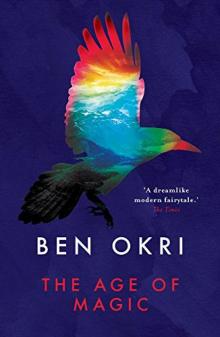 The Age of Magic
The Age of Magic Infinite Riches
Infinite Riches Songs of Enchantment
Songs of Enchantment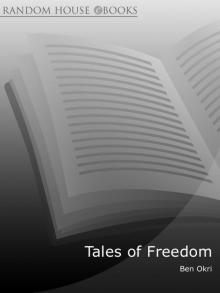 Tales of Freedom
Tales of Freedom Dangerous Love
Dangerous Love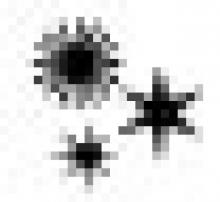 Starbook
Starbook The Famished Road
The Famished Road Astonishing the Gods
Astonishing the Gods A Fire in My Head
A Fire in My Head The Freedom Artist
The Freedom Artist The Comic Destiny
The Comic Destiny A Way of Being Free
A Way of Being Free Prayer for the Living
Prayer for the Living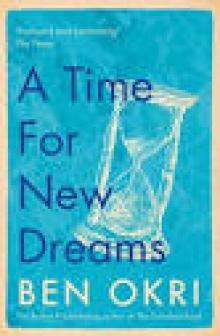 A Time for New Dreams
A Time for New Dreams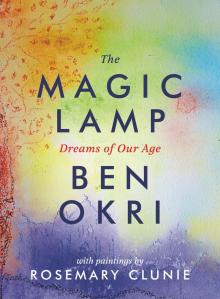 The Magic Lamp
The Magic Lamp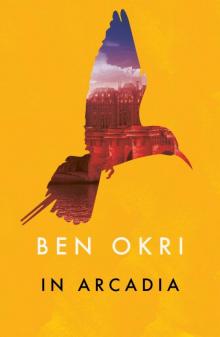 In Arcadia
In Arcadia